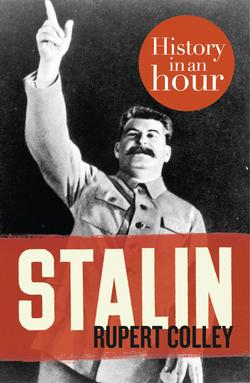Читать книгу Stalin: History in an Hour - Rupert Colley - Страница 10
ОглавлениеStalin, Lenin and Trotsky
Lenin soon regretted his haste in over-promoting Stalin, falling out with his General Secretary over the latter’s handling of Georgia. Originally, the Bolsheviks had promised the Russian nations self-determination but, once in power, they reneged on that promise, wanting to keep all nations of the former Russian Empire within the Soviet orbit.
Stalin and Lenin, March 1919
The Civil War had intensified these hopes and Georgia had enjoyed a brief spell of independence from May 1918 until February 1921 when the Red Army re-asserted Moscow’s control. Lenin advised a conciliatory approach, advice that Stalin, along with his fellow countryman, Sergo Ordzhonikidze, ignored by imposing a crackdown on Georgian autonomy and executing its leaders in 1922.
Lenin’s Testament
Lenin was furious with his ‘wonderful Georgian’ but in May 1922 he suffered the first of three strokes, greatly diminishing his ability to maintain command. In December 1922, Lenin wrote his Testament, in which he commented on individual members of the Party’s Central Committee. His most damning judgement was reserved for his General Secretary, whom he described as having ‘unlimited authority concentrated in his hands … I am not sure whether he will always be capable of using that authority with sufficient caution’. Stalin’s bullish behaviour in Georgia was Lenin’s case-in-point. More damning still for Stalin was Lenin’s addendum to his Testament, written ten days later, in which he declared:
‘Stalin is too rude and this defect, although quite tolerable in our midst and in dealing among us Communists, becomes intolerable in a Secretary-General. That is why I suggest the comrades think about a way of removing Stalin from that post and appointing another man in his stead who in all other respects differs from Comrade Stalin in having only one advantage, namely, that of being more tolerant, more loyal, more polite, and more considerate to the comrades, less capricious, etc.’
Although the Central Committee had made Stalin their main contact with Lenin during his illness, the doctors had agreed that Lenin should be permitted no visitors. Stalin began to suspect, correctly, that Lenin’s wife, Nadezhda Krupskaya, whom Stalin had never liked, was feeding her husband pro-Trotsky and anti-Stalinist information. On 22 December, Stalin telephoned Krupskaya, called her a ‘syphilitic whore’ and, in her words, ‘subjected me to a storm of the coarsest abuse’. Krupskaya was a resilient woman but Stalin’s tirade reduced her to a nervous wreck. Stalin was unrepentant: ‘just because she uses the same toilet as Lenin doesn’t mean she understands Marxism–Leninism’. Lenin didn’t find out about the call until three months later and when he did, he wrote a letter to Stalin:
You have been so rude as to summon my wife to the telephone and use bad language ... what has been done against my wife I consider having been done against me. I ask you, therefore, to think it over whether you are prepared to… make your apologies, or whether you prefer that relations between us should be broken off.
The next day, 6 March 1923, Lenin suffered his third stroke, which left him bedridden and mute. He died ten months later, on 21 January 1924, aged fifty-three.
Stalin visits Lenin during Lenin’s convalescence
Krupskaya remained a thorn in Stalin’s side, demanding that Lenin’s Testament be read out, as her husband had wished, at the forthcoming Thirteenth Party Congress, due in May 1924. Determined to suppress it, Stalin silenced her by threatening to find Lenin a ‘new widow’; Krupskaya was to die, a frightened woman, aged seventy in 1939.
Stalin took the lead in organising Lenin’s funeral and appeared as the chief pallbearer. Trotsky, who was recovering from illness near the Black Sea, missed the funeral – Stalin having deliberately told him the wrong date. Stalin initiated the deification of Lenin, in which the great leader’s image was seen everywhere and his memory held in reverential terms. Within days of his death, Petrograd was renamed Leningrad. Stalin’s broken relationship with Lenin was quietly forgotten and he reinvented himself as the bearer of Lenin’s legacy. To doubt Stalin was to doubt Lenin and question the whole legitimacy of the Revolution.
Opposition
Kamenev and Zinoviev, motivated by their fear of the arrogant Trotsky, joined forces with Stalin and together the three men assumed unofficial leadership of the Party as a troika. Between them they managed to get the Central Committee to agree on suppressing Lenin’s Testament. Stalin had offered to resign over the issue. The committee, including Trotsky, rejected his offer. They would all pay dearly for their support.
Leon Trotsky
Trotsky and his supporters, labelled as the ‘Left Opposition’, opposed the party on many accounts and were attacked on all sides. Their views, ‘Trotskyism’, became a profanation of immense proportions. Stalin had on his side Kamenev, Zinoviev and Pravda editor Nikolai Bukharin, Lenin’s ‘favourite of the whole Party’.
Nikolai Bukharin
Stalin used his power to dismiss his perceived dissenters within the Party and replace them with loyal followers. In January 1925, Stalin was strong enough to force Trotsky’s resignation from his post of People’s Commissar for War.
Kamenev and Zinoviev felt that perhaps Lenin had been right after all – that Stalin had too much power. At the Fourteenth Party Congress in December 1925, Kamenev suggested that Stalin be removed from his position as General Secretary and that his accumulation of power was ‘harmful to the Party’. He received a hostile reception.
